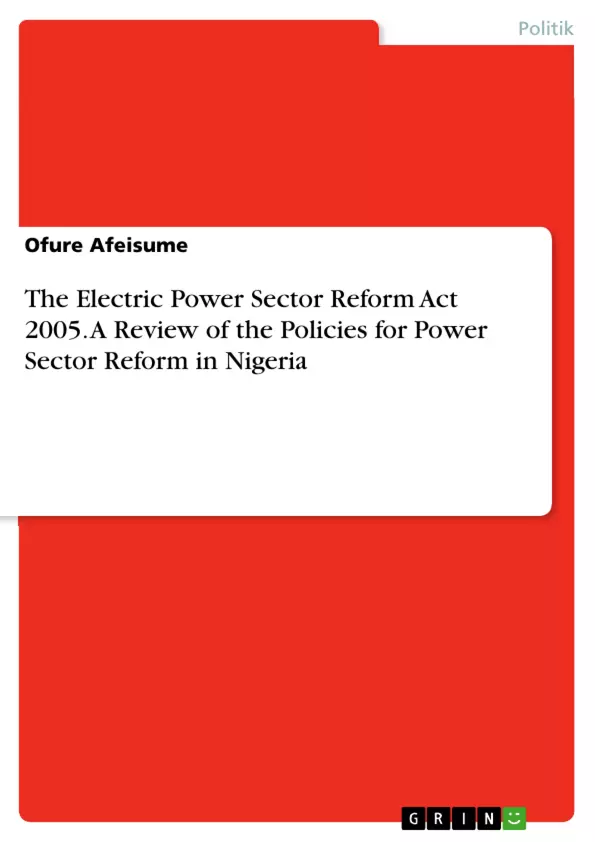The Nigeria Power Sector appeared to have an awesome history of electricity governance, but the development of the sector has been greatly impeded. This could be as a result of its inability or failure to effectively implement the legal policies and institutional frameworks and more still the proactive measures to bring about effective sector regulation through sustainable socially, economically viable and proactive management of the power sector in Nigeria.
The current system of power sector reform began in the year 2000 with the implementation of the Electric Power Implementation Committee (EPIC). The committee drafted the National Electric Power Policy (NEPP) in the year 2001, leading to the Electric Power Sector Reform Act 2005. The reform comprised essentially two main components, including: restructuring and privatization1. It is based on this premise that this essay sought to review the policies for power sector reform in Nigeria, with emphasis on the Electric Power Sector Reform Act 2005.
Inhaltsverzeichnis
- Introduction
- Main Discussion
- The Electric Power Sector Reform Act (EPSR) 2005
- Renewable Energy Sources
- Limiting Factors of Previous Policies
- Conclusion
Zielsetzung und Themenschwerpunkte
Dieser Essay befasst sich mit der Reform des Energiesektors in Nigeria, insbesondere mit dem Electric Power Sector Reform Act von 2005. Das Ziel ist es, die politischen Rahmenbedingungen der Reform zu analysieren und die Herausforderungen und Chancen zu beleuchten, die mit der Umsetzung der neuen Gesetze und Regulierungen verbunden sind.
- Die Rolle des Electric Power Sector Reform Act 2005 bei der Restrukturierung des Energiesektors
- Die Bedeutung von erneuerbaren Energiequellen für die nachhaltige Energieversorgung in Nigeria
- Die Herausforderungen bei der Implementierung der Reform, insbesondere in Bezug auf die politischen, wirtschaftlichen und sozialen Rahmenbedingungen
- Die Bedeutung von transparenten und gerechten Regulierungsmechanismen für den Erfolg der Reform
- Die Notwendigkeit von Investitionen in Infrastruktur und Technologie, um die Energieversorgung in Nigeria zu verbessern
Zusammenfassung der Kapitel
Introduction
Die Einleitung stellt die aktuelle Situation des Energiesektors in Nigeria dar und beschreibt die Herausforderungen, die mit der Entwicklung des Sektors verbunden sind. Die Einführung des Electric Power Sector Reform Act 2005 als Teil der Bemühungen um die Verbesserung der Energieversorgung wird erläutert.
Main Discussion
Dieser Abschnitt analysiert die wichtigsten Elemente des Electric Power Sector Reform Act 2005, einschließlich der Restrukturierung des Sektors und der Einführung neuer Regulierungsmechanismen. Die Bedeutung erneuerbarer Energiequellen und die Herausforderungen bei der Implementierung der Reform werden diskutiert.
Schlüsselwörter
Die wichtigsten Schlüsselwörter und Schwerpunktthemen dieses Essays sind: Energiesektor, Reform, Electric Power Sector Reform Act 2005, Nigeria, erneuerbare Energiequellen, Regulierung, Herausforderungen, Chancen, Investitionen, Infrastruktur, Technologie.
Häufig gestellte Fragen
Was war das Ziel des Electric Power Sector Reform Act (EPSRA) 2005?
Ziel war die grundlegende Restrukturierung und Privatisierung des nigerianischen Stromsektors, um die Effizienz zu steigern und die chronische Energieknappheit zu beheben.
Warum scheiterten frühere Energiereformen in Nigeria?
Häufige Gründe waren mangelnde politische Umsetzung, schwache rechtliche Rahmenbedingungen und das Fehlen proaktiver Regulierungsmechanismen.
Welche Rolle spielen erneuerbare Energien in der Reform?
Die Reform betont die Bedeutung nachhaltiger Energiequellen, um eine langfristig sozial und ökonomisch tragfähige Energieversorgung in Nigeria sicherzustellen.
Was sind die Kernkomponenten der Reform von 2005?
Die wesentlichen Bestandteile sind die Restrukturierung der staatlichen Energiebehörden und die Privatisierung der Stromerzeugung und -verteilung.
Welche Investitionen sind für den Erfolg der Reform nötig?
Es bedarf massiver Investitionen in die Infrastruktur und moderne Technologien, um die Übertragungsverluste zu minimieren und die Kapazitäten zu erweitern.
- Citar trabajo
- Ofure Afeisume (Autor), 2020, The Electric Power Sector Reform Act 2005. A Review of the Policies for Power Sector Reform in Nigeria, Múnich, GRIN Verlag, https://www.grin.com/document/516477



